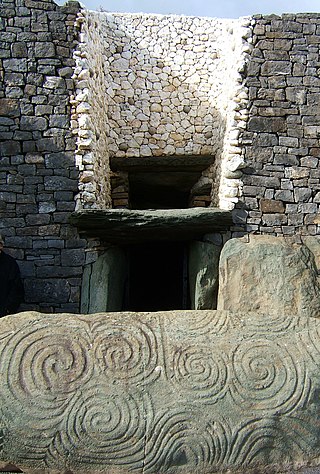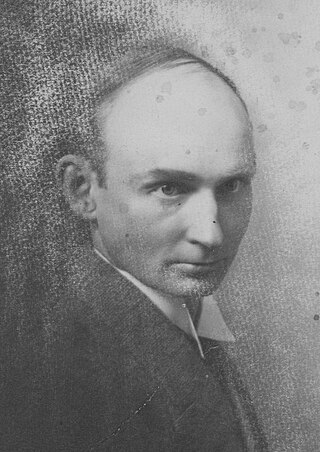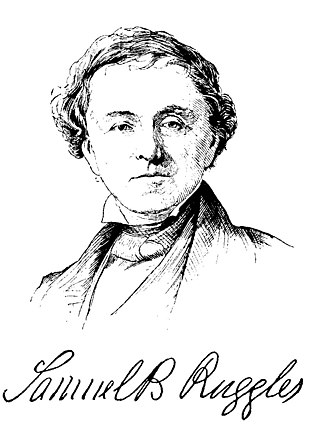Related Research Articles

Archaeoastronomy is the interdisciplinary or multidisciplinary study of how people in the past "have understood the phenomena in the sky, how they used these phenomena and what role the sky played in their cultures". Clive Ruggles argues it is misleading to consider archaeoastronomy to be the study of ancient astronomy, as modern astronomy is a scientific discipline, while archaeoastronomy considers symbolically rich cultural interpretations of phenomena in the sky by other cultures. It is often twinned with ethnoastronomy, the anthropological study of skywatching in contemporary societies. Archaeoastronomy is also closely associated with historical astronomy, the use of historical records of heavenly events to answer astronomical problems and the history of astronomy, which uses written records to evaluate past astronomical practice.

Carl Ruggles was an American composer, painter and teacher. His pieces employed "dissonant counterpoint", a term coined by fellow composer and musicologist Charles Seeger to describe Ruggles' music. His method of atonal counterpoint was based on a non-serial technique of avoiding repeating a pitch class until a generally fixed number of eight pitch classes intervened. He is considered a founder of the ultramodernist movement of American composers that included Henry Cowell and Ruth Crawford Seeger, among others. He had no formal musical education, yet was an extreme perfectionist—writing music at a painstakingly slow rate and leaving behind a very small output.

The Stamp Act Congress, also known as the Continental Congress of 1765, was a meeting held in New York City in the colonial Province of New York. It included representatives from most of the British colonies in North America, which sought a unified strategy against newly imposed taxes by the British Parliament, particularly the Stamp Act 1765. It was the second such gathering of elected colonial representatives after the Albany Convention of 1754 at the outbreak of the French and Indian War. Massive debts from that war, which ended in 1763, prompted the British Parliament to implement measures to raise revenues from the colonies. The Stamp Act 1765 required the use of specialty stamped British paper for all legal documents, newspapers, almanacks, and calendars, and even playing cards and dice. When in force, it would have an impact on practically all business in the colonies, starting on November 1, 1765. Resistance to it came especially from lawyers and businessmen, but was broadly protested by ordinary colonial residents.

Charles Sherman Ruggles was an American comic character actor. In a career spanning six decades, Ruggles appeared in close to 100 feature films, often in mild-mannered and comic roles. He was also the elder brother of director, producer, and silent film actor Wesley Ruggles (1889–1972).

John Ruggles was an American politician from the U.S. state of Maine. He served in several important state legislative and judicial positions before serving in the U.S. Senate.

Ruggles station is an intermodal transfer station in Boston, Massachusetts. It serves Massachusetts Bay Transportation Authority (MBTA) rapid transit, bus, and commuter rail services and is located at the intersection of Ruggles and Tremont streets, where the Roxbury, Fenway–Kenmore, and Mission Hill neighborhoods meet. It is surrounded by the campus of Northeastern University. Ruggles is a station stop for the Orange Line subway, as well as the Providence/Stoughton Line, Franklin/Foxboro Line, and Needham Line of the MBTA Commuter Rail system. Thirteen MBTA bus routes stop at Ruggles.

Colonel Sir Edward Archibald Ruggles-Brise, 1st Baronet was a British Conservative Party politician.

Daniel Ruggles was a Brigadier General in the Confederate States Army during the American Civil War. He was a division commander at the Battle of Shiloh.

David Ruggles was an African-American abolitionist in New York who resisted slavery by his participation in a Committee of Vigilance, which worked on the Underground Railroad to help fugitive slaves reach free states. He was a printer in New York City during the 1830s, who also wrote numerous articles, and "was the prototype for black activist journalists of his time." He claimed to have led more than 600 fugitive slaves to freedom in the North, including Frederick Douglass, who became a friend and fellow activist. Ruggles opened the first African-American bookstore in 1834.

Sir Evelyn John Ruggles-Brise was a British prison administrator and reformer, and founder of the Borstal system.
The American Five is a collective name applied by some writers to the modernist American composers Charles Ives (1874–1954), John J. Becker (1886–1961), Wallingford Riegger (1885–1961), Henry Cowell (1897–1965), and Carl Ruggles (1876–1971). They were noted for their modernist and often dissonant compositions which broke away from European compositional styles to create a distinctly American style. The name was coined in imitation of the group of Russian composers called The Five.

Samuel Bulkley Ruggles was an American lawyer and politician from New York. He was a member of the New York State Assembly in 1838, and a Canal Commissioner from 1839 to 1842 and in 1858. As a large landholder, he donated the land for the creation of Gramercy Park in New York City. Its restrictive covenant has preserved it through much development nearby. He was a member of the city's Chamber of Commerce, which published his reports on economics and public policy. In the 1860s, he represented the United States at several international conferences on economics and statistics in Europe.
William Ruggles was an American professor at George Washington University.

Reginald Ruggles Gates, was a Canadian-born geneticist who published widely in the fields of botany and eugenics.
John Ruggles Case was an American track and field athlete who competed in the 1912 Summer Olympics. He was born in Evanston, Illinois and died in Oceanside, California. In 1912, he finished fourth in the 110 metre hurdles competition.
Clive L. N. Ruggles is a British astronomer, archaeologist and academic. He is the author of academic and popular works on the subject. In 1999, he was appointed professor of archaeoastronomy at the School of Archaeology and Ancient History, University of Leicester, when it is believed to have been the only appointed chair for archaeoastronomy among the world's universities. As of 2023, he was Emeritus Professor at this university.

The 1834–35 United States Senate elections were held on various dates in various states. As these U.S. Senate elections were prior to the ratification of the Seventeenth Amendment in 1913, senators were chosen by state legislatures. Senators were elected over a wide range of time throughout 1834 and 1835, and a seat may have been filled months late or remained vacant due to legislative deadlock. In these elections, terms were up for the senators in Class 2.
The lynching of the Ruggles brothers took place on July 24, 1892 in Redding, California.

Levi Ruggles (1824–1889) known as the "Father of Florence, Arizona" was a soldier and pioneer who founded the town of Florence, Arizona.

An axial stone circle is a megalithic ring of stones of a particular design found in County Cork and County Kerry in southwest Ireland. Archaeologists have found it convenient to consider the axial five-stone circle and axial multiple-stone circle separately. The circle has an approximate axis of symmetry aligned in a generally northeast–southwest direction. The stone at the southwest side of the circle, rather than being an upright orthostat like all the rest, is a slab lying horizontally with its long thin edge along the circumference of the ring. Because it marks the axis of the circle it is called the axial stone.
References
- ↑ "John Ruggles". Olympedia. Retrieved 7 June 2020.